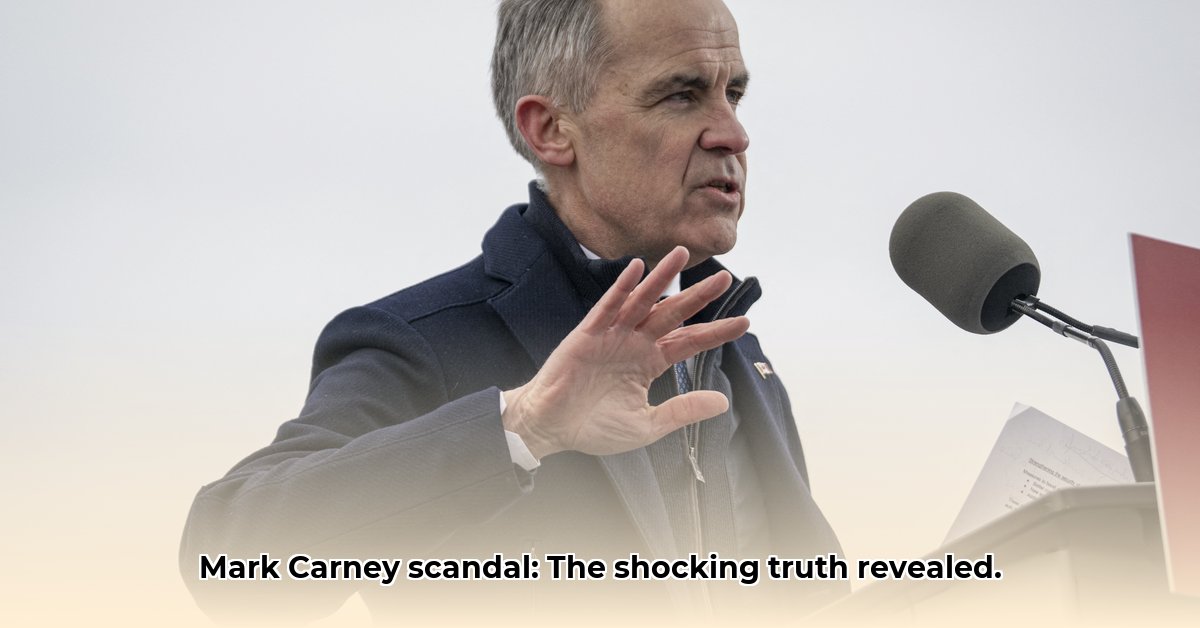
The Carney-Brookfield Appointment: A Source of Contention
Former Bank of England Governor Mark Carney's appointment as chair of Brookfield Asset Management, a global investment firm, has ignited a significant controversy in Canada. The appointment has been met with both praise and stark criticism, highlighting concerns about Brookfield's use of offshore tax havens, its impact on the Canadian housing market, and the ethical implications of Carney's role within the company. This article examines the details of this complex situation, clarifying the central issues and exploring potential consequences. For more on Carney's controversies, see this article.
Brookfield's Business Practices Under Scrutiny
Brookfield Asset Management, a multinational corporation with vast holdings across numerous sectors, faces accusations of employing aggressive tax avoidance strategies through subsidiaries based in jurisdictions like Bermuda, a known tax haven. This practice raises questions regarding corporate social responsibility and ethical conduct. Concerns extend beyond tax practices to include the firm's impact on the Canadian housing market. Some critics argue that Brookfield's involvement exacerbates housing affordability challenges, leveraging market fluctuations to its financial advantage. Understanding the scale and complexities of Brookfield's global operations is crucial to assessing these concerns effectively.
Analyzing the Accusations: Evidence and Counterarguments
The controversy surrounding Mark Carney’s role centers on the extent of his responsibility for Brookfield's actions. While opposition parties hold him accountable for the firm's practices, experts such as Richard Leblanc, a prominent corporate governance professor at York University, argue that a board chair's operational control is limited. Carney himself has denied any involvement in tax avoidance schemes. This lack of clear evidence at the heart of the matter contributes to the ongoing debate. The central question remains: what level of accountability should be expected from a board chair of a large multinational corporation?
Canadian Political Implications and Regulatory Frameworks
This controversy extends beyond the individual players, impacting the Canadian political landscape and regulatory environment. The current government's policies regarding public-private partnerships and investment incentives are under close scrutiny. Critics argue that these policies create an environment that may unduly favor large corporations and potentially overlook ethical concerns. The controversy highlights broader questions about corporate governance, taxation, and the influence of large multinational companies on Canadian society. How can Canada ensure accountability and fairness while fostering economic growth?
Potential Outcomes and Future Actions
The implications of the controversy are far-reaching and will likely extend beyond the current election cycle. Several stakeholders are expected to take a variety of actions:
Mark Carney and the Liberal Party: Increased transparency and forthright explanations of any potential conflicts of interest are likely in the short term, leading to stronger corporate governance rules and clearer definitions of board chair responsibilities in the long term.
Opposition Parties: Short-term actions will likely focus on sustained pressure on the government for stricter regulations, culminating in long-term calls for legislative reform and increased corporate tax transparency.
Brookfield Asset Management: Short-term actions may include improved communication and internal ethical practice reviews, transitioning to stronger internal controls and a greater emphasis on corporate social responsibility in the long term.
The Canadian Public: Demands for increased transparency and thorough evaluation of the situation in the short term will likely translate into support for independent investigations and advocacy for fairer tax policies over the long term.
Risk Assessment: Potential Negative Consequences
The controversy presents several significant risks:
Reputational Damage to Mark Carney: High likelihood, severe impact. Mitigation strategies include open communication, increased transparency, and a demonstrable commitment to ethical business conduct.
Political Backlash Against the Liberal Party: High likelihood, severe impact. Mitigation involves a robust response to concerns, reform commitments, and a clear separation from questionable practices.
Regulatory Scrutiny of Brookfield: Possibly high likelihood, severe impact. Mitigation strategies include improved compliance, proactive regulatory engagement, and rigorous internal audits.
Decreased Investor Confidence: Possibly high likelihood, moderate impact. Mitigation requires very clear communication, responsible investment approaches, and increased transparency.
Conclusion: The Need for Greater Transparency and Accountability
The Mark Carney-Brookfield controversy underscores an urgent need for enhanced transparency and accountability within Canada's financial sector. It serves as a catalyst for discussions regarding corporate governance, tax policies, and the overall role of large corporations in Canadian society. The long-term consequences will likely reshape regulations and governance practices, fostering a system that prioritizes ethical conduct and equitable outcomes for all stakeholders. The ongoing necessity for careful consideration of corporate responsibility and the potential for conflict of interest arising from connections between the private and public sectors cannot be overstated.
Key Takeaways:
- The controversy highlights weaknesses in Canada's corporate governance and tax regulations.
- Mark Carney’s role faces intense scrutiny regarding his responsibility for Brookfield's actions.
- The issue underscores the complexities of balancing economic growth with ethical considerations.